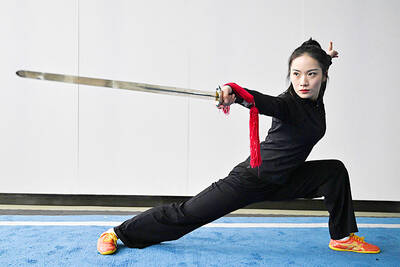China’s top climate change official on Wednesday rejected as protectionist a US idea to put tariffs on some imports from countries that do not place a price on carbon, chiding the US to do more to cut its greenhouse gas emissions.
US Energy Secretary Steven Chu on Tuesday told a congressional panel that once Washington develops a system limiting carbon emissions, the US would be at a disadvantage if other countries did not impose a cost on carbon emissions.
Chu told the House of Representatives’ Science and Technology Committee that the tax idea was just one proposal the administration of US President Barack Obama should evaluate. He voiced hope that fast-growing developing countries such as China and India would take steps to reduce their emissions.
But Xie Zhenhua (謝振華), head of China’s Climate Change and Coordinating Committee said: “Climate change and charging carbon taxes in imports ... are two issues in two areas” and should be tackled in separate negotiating forums.
“I oppose using climate change as an excuse to practice protectionism on trade,” Xie, a former environment minister, told the Carnegie Endowment for International Peace, a Washington think tank.
Earlier this week, Li Gao (李高), director of China’s Department of Climate Change, said countries that buy Chinese goods should be held responsible for the carbon dioxide emitted by the factories that make them in any global plan to reduce greenhouse gases.
Unlike the US, China joined the Kyoto Protocol but is not required to cut its emissions because it is a developing country.
China’s greenhouse gas emissions are now thought to be around the levels of those in the US, which has led the world in emissions.
But Xie, who said he held fruitful consultations with Chu and other Obama administration officials, rejected the premise that China was a laggard in tackling emissions of greenhouse gases.
“China is not a country that does nothing,” he said. “On the contrary we have done a lot,” said Xie, who listed a set of market-based measures on pricing, taxes and financial incentives China was using to cut its emissions.
“The United States is in the same boat. They just talk about it but there are no actions, and we don’t even know whether Congress will pass it,” he said.

ANGER: A video shared online showed residents in a neighborhood confronting the national security minister, attempting to drag her toward floodwaters Argentina’s port city of Bahia Blanca has been “destroyed” after being pummeled by a year’s worth of rain in a matter of hours, killing 13 and driving hundreds from their homes, authorities said on Saturday. Two young girls — reportedly aged four and one — were missing after possibly being swept away by floodwaters in the wake of Friday’s storm. The deluge left hospital rooms underwater, turned neighborhoods into islands and cut electricity to swaths of the city. Argentine Minister of National Security Patricia Bullrich said Bahia Blanca was “destroyed.” The death toll rose to 13 on Saturday, up from 10 on Friday, authorities

Local officials from Russia’s ruling party have caused controversy by presenting mothers of soldiers killed in Ukraine with gifts of meat grinders, an appliance widely used to describe Russia’s brutal tactics on the front line. The United Russia party in the northern Murmansk region posted photographs on social media showing officials smiling as they visited bereaved mothers with gifts of flowers and boxed meat grinders for International Women’s Day on Saturday, which is widely celebrated in Russia. The post included a message thanking the “dear moms” for their “strength of spirit and the love you put into bringing up your sons.” It

DEBT BREAK: Friedrich Merz has vowed to do ‘whatever it takes’ to free up more money for defense and infrastructure at a time of growing geopolitical uncertainty Germany’s likely next leader Friedrich Merz was set yesterday to defend his unprecedented plans to massively ramp up defense and infrastructure spending in the Bundestag as lawmakers begin debating the proposals. Merz unveiled the plans last week, vowing his center-right Christian Democratic Union (CDU)/Christian Social Union (CSU) bloc and the center-left Social Democratic Party (SPD) — in talks to form a coalition after last month’s elections — would quickly push them through before the end of the current legislature. Fraying Europe-US ties under US President Donald Trump have fueled calls for Germany, long dependent on the US security umbrella, to quickly

In front of a secluded temple in southwestern China, Duan Ruru skillfully executes a series of chops and strikes, practicing kung fu techniques she has spent a decade mastering. Chinese martial arts have long been considered a male-dominated sphere, but a cohort of Generation Z women like Duan is challenging that assumption and generating publicity for their particular school of kung fu. “Since I was little, I’ve had a love for martial arts... I thought that girls learning martial arts was super swaggy,” Duan, 23, said. The ancient Emei school where she trains in the mountains of China’s Sichuan Province